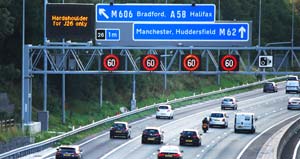2021 UK Motoring Overview in Brief

The latest annual RAC Report on Motoring was published in December 2021 and sought views from UK motorists on a wide range of topics. Drivers including people working within the motor trade were asked for their opinions on subjects such as smart motorways, the change in driving habits during and hopefully after the Covid-19 pandemic, as well as electric vehicles.
Just over 2,650 motorists were surveyed, all of whom were asked to list their biggest issues with UK motoring at present. Several topics were clearly identified as causing the most problems, with over 46% of respondents bemoaning the state of local roads. This was a rise of over 8% from the previous year.
Over 30% also identified mobile phone use at the wheel as a significant problem, comparable to 2020’s figure. Poor driving in general, as well as aggressive motoring, were also cited as major concerns. Surprisingly, only a quarter of those surveyed identified high fuel costs, a similar number to those were concerned about smart motorways.
The pandemic has naturally reinforced driver attitudes to their cars and independence.
While usage of vehicles has fallen sharply, mainly due to lockdown restrictions and the impact of home working for many, a record 82% of the surveyed said they could not do without their vehicle, with the youngest and oldest age groups especially reliant on their own transport needs.
Many said they wouldn’t consider switching to public transport, regardless of cost or convenience, with over 30% indicating that private car ownership and use is much more important than ever.
Approximately three quarters of respondents couldn’t envisage being without their vehicles at any time in the future, regardless of other options and possibly rising motoring costs including their insurance policy.
Naturally, the biggest complaint over public transport was lack of availability, especially in rural areas, while half use a car as walking or cycling to work isn’t feasible due to the time and distance involved.
Those in the South East and North West of England were particularly unlikely to switch to using public transport, while more than half also felt that safety and health issues would prevent them from using buses or trams in the near future.
Going forward, 42% of young drivers indicated they’d use their cars more in the future, predominantly for leisure, but more than half of those also said they’d drive to work more. Some 85% of those surveyed wanted to use hybrid or home working on a long-term basis, with 19% indicating they will now be permanent homeworkers.
One of the biggest issues for concerned motorists were smart motorways, with no hard shoulders in operation for much of the time. Drivers of new and used vans or cars simply do not like the lack of safety options in the event of a breakdown.

While variable speed limits and increased use of signage weren’t major concerns, the lack of a safe place to stop really did worry the respondents. Almost half of the over 65s particularly felt this to be a worry, while around a quarter listed it among their top concerns in all their motoring experience.
Less than half (43%) suggested they felt safe using such motorways, while the proportion of those indicating concern fell through the age groups but was still a significant 25% of the 17-24 age group.
More than 79% felt that breaking down was a major worry, and only 45% indicated they knew how to react in the event of a malfunction. Disturbingly, a quarter of drivers said they always ignored lane closure warning signs.
Finally, 62% would like to see smart motorways scrapped and safety lanes or hard shoulders restored, regardless of the impact on congestion.
Let’s hope 2022 brings a safe, healthy, and prosperous year for all motorists and everyone involved or working within the motor trade industry.






